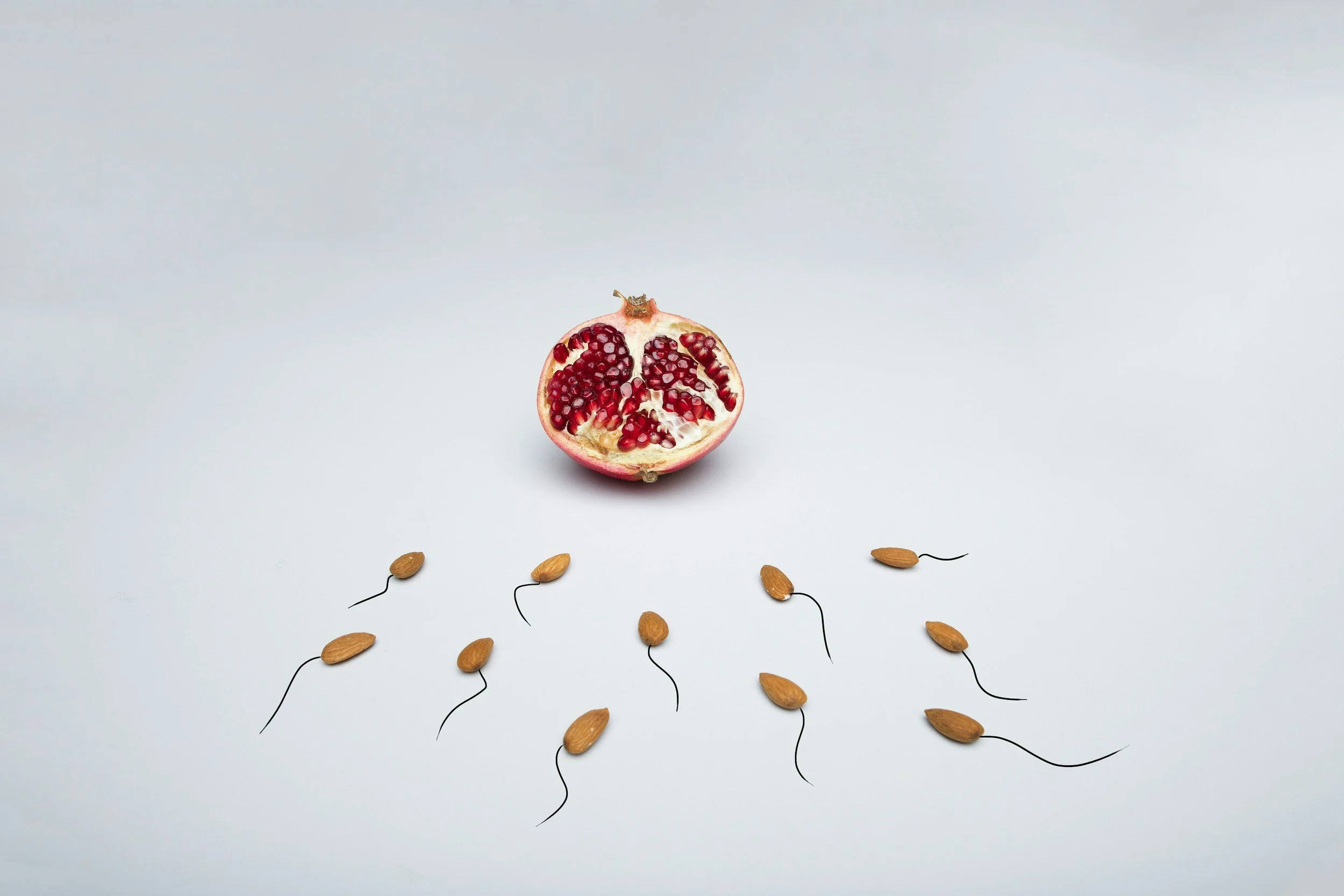Male Fertility: A Natural Approach to Boosting Reproductive Health
Male fertility plays an equal role in conception—and yet it’s often overlooked. Studies show that male factors contribute to nearly 50% of fertility issues among couples seeking support from fertility clinics (Agarwal et al., 2015). Fortunately, simple changes in lifestyle and nutrition can dramatically improve sperm quality, even in men preparing for IVF, ICSI, or IUI.
Step One: Understand the Basics
What is a Semen Analysis?
A semen analysis evaluates three key parameters:
Volume: ≥ 1.5 ml
Count: ≥ 15 million sperm/ml
Motility: At least 32% should be progressively motile
Morphology: Minimum 4% should have normal shape
Source: World Health Organization (WHO) Guidelines, 2015
If results fall outside of these ranges, further tests such as sperm DNA fragmentation or antisperm antibody testing may be recommended.
What is Sperm DNA Fragmentation?
Sperm DNA fragmentation refers to breaks or damage in the DNA within sperm cells. While some fragmentation is normal, levels above 30% have been linked to infertility, miscarriages, and failed IVF cycles (Evenson & Wixon, 2006).
What causes sperm DNA damage?
Oxidative stress from inflammation or infection
Varicocele (enlarged veins in the scrotum)
Obesity and smoking
Frequent heat exposure (saunas, hot baths, prolonged sitting)
Nutritional deficiencies
Environmental toxins (e.g. pesticides, plastics)
Aging and diabetes
The Natural Approach: Lifestyle & Nutrition
Even if you’re undergoing fertility treatment, improving your health can improve the quality of the sperm used on procedure day. Here’s how to start:
The Fertility Diet for Men
Research shows that dietary patterns rich in antioxidants, omega-3 fatty acids, and plant-based foods are strongly associated with improved semen parameters and reduced DNA fragmentation (Salas-Huetos et al., 2018).
Foods to Focus On:
Abundant fruits and vegetables
Nuts and seeds as snacks
Lean fish, particularly oily varieties
Pulses and legumes
Whole grains
Limit processed foods, red meat, and fried foods
Key Nutrients That Improve Sperm Health
1. Zinc
Zinc is crucial for sperm formation, maturation, and motility. It’s also part of zinc-copper superoxide dismutase (SOD), a powerful antioxidant that protects sperm DNA.
Food sources: Meat, chickpeas, pumpkin seeds, cashews
Supplementation is often recommended during ART cycles
Note: PPI medications (for acid reflux) can reduce zinc absorption
Reference: Wong et al., 2002 (Fertility & Sterility)
2. Selenium
Selenium concentrates in the testes and supports glutathione peroxidase (GPX), an antioxidant enzyme that guards sperm from oxidative damage.
Top source: Brazil nuts (just 1 nut may meet daily needs)
Also found in meat, eggs, shellfish
Reference: Bleau et al., 2007 (Biol Trace Elem Res)
3. Vitamins C &
These work synergistically:
Vitamin C (water-soluble) protects against oxidative sperm DNA damage
Vitamin E (fat-soluble) stabilizes sperm membrane integrity
Clinical studies show both reduce DNA fragmentation and improve motility (Greco et al., 2005; Suleiman et al., 1996)
4. Omega-3 Fatty Acids
Essential for sperm membrane structure and fluidity, omega-3s improve motility, morphology, and protect against inflammation.
Eat oily fish twice a week (e.g., salmon, mackerel)
Consider supplements with at least 500mg EPA + DHA
Reference: Safarinejad, 2011 (Hum Reprod)
5. Vitamin D
Sperm cells have receptors for Vitamin D. Higher levels have been linked to better sperm motility and increased conception rates, especially in sunnier months.
Get tested before supplementing—excess can be toxic
Reference: Blomberg Jensen et al., 2011 (J Clin Endocrinol Metab)
Lifestyle Tips to Boost Male Fertility
Exercise Regularly
Brisk walking, swimming, and strength training improve insulin sensitivity and hormone balance.
Avoid prolonged sitting and excess weight around the abdomen.
Reference: Vaamonde et al., 2012
Avoid Heat Exposure
Hot tubs, saunas, tight underwear, laptops on laps, and prolonged driving can overheat the testes and reduce sperm quality.
Quit Smoking
Smoking increases oxidative stress and significantly lowers sperm motility and morphology.
Reference: Sharma et al., 2016 (Andrology)
Limit Alcohol & Caffeine
Keep caffeine intake under two cups of coffee per day
Reduce or eliminate alcohol, particularly in the 2–3 months before trying to conceive
Reference: Ricci et al., 2017 (Reprod Biol Endocrinol)
Where to Start? Small Steps, Big Impact
Trying to conceive is a journey. The best way to begin is to take small, consistent actions:
Walk at least 20 minutes a day
Add more colors to your plate—fruits and veggies
Eat oily fish twice a week
Cut back on fried, sugary, and ultra-processed foods
Start reducing smoking, drinking, and unnecessary medications
Final Thoughts
Male fertility is just as important as female fertility—and it’s often highly responsive to changes in lifestyle, nutrition, and mindset. Whether you’re preparing for assisted reproduction or trying naturally, supporting sperm health gives you the best chance of success.
Need help creating a fertility-friendly diet plan? I offer personalized nutrition consultations to help you make the right changes, step by step.
References
Agarwal A, Mulgund A, Hamada A, Chyatte MR. (2015). A unique view on male infertility around the globe. Reproductive Biology and Endocrinology, 13, 37.
World Health Organization. (2010). WHO laboratory manual for the examination and processing of human semen. 5th ed.
Evenson DP, Wixon R. (2006). Clinical aspects of sperm DNA fragmentation detection and male infertility. Theriogenology, 65(5), 979–991.
Wong WY et al. (2002). Effects of folic acid and zinc sulfate on male factor subfertility: a double-blind, randomized, placebo-controlled trial. Fertility and Sterility, 77(3), 491–498.
Safarinejad MR. (2011). Omega-3 fatty acids improve semen quality and oxidative stress parameters in infertile men: a randomized, double-blind, placebo-controlled study. Human Reproduction, 26(3), 543–552.
Greco E, Iacobelli M, Rienzi L, Ubaldi F, Ferrero S, Tesarik J. (2005). Reduction of the incidence of sperm DNA fragmentation by oral antioxidant treatment. Journal of Andrology, 26(3), 349–353.
Salas-Huetos A, Bulló M, Salas-Salvadó J. (2018). Dietary patterns, foods and nutrients in male fertility parameters and fecundability: a systematic review of observational studies. Human Reproduction Update, 23(4), 371–389.
Blomberg Jensen M, et al. (2011). Vitamin D is positively associated with sperm motility and increases intracellular calcium in human spermatozoa. The Journal of Clinical Endocrinology & Metabolism, 96(7), E1031–E1039.


